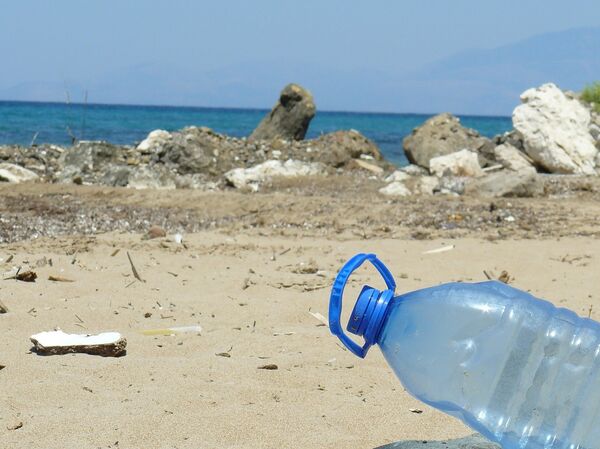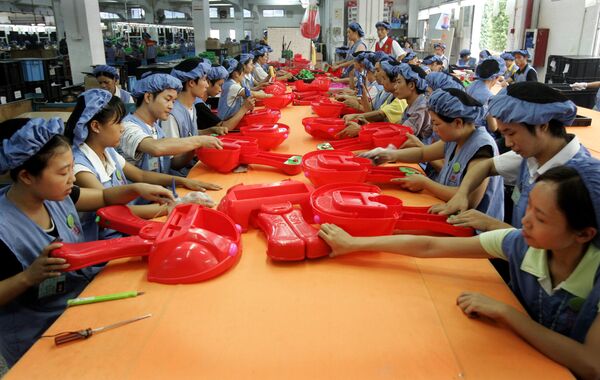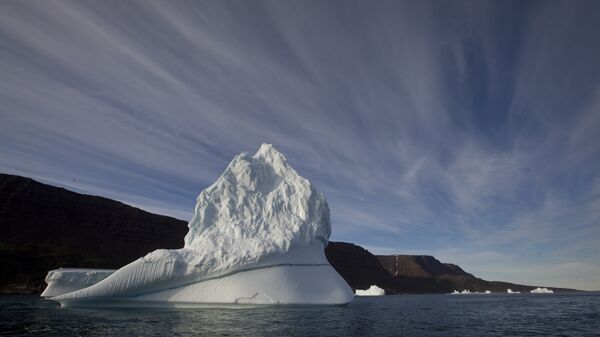Sputnik: How serious is the increase in plastic production and what dangers does it pose to the environment and human health?
Carolyn Roberts: If I start off with the second of those issues, the damage that plastics are causing, there is no doubt that plastics have some benefits. We need plastics, for example, for food preservation; they perform a very useful role there.
The problem is that they escape into places in the environment where we do not need them. We now know from recent research that plastic particles are found almost everywhere on Earth. The area that’s hit the headlines recently is plastic in the oceans, where we now know that micro-particles of plastics are found everywhere from the Pacific through to the Arctic. In every ocean – certainly all the ones around Russia – we find them.
So there are some pretty big issues there. At the moment, my opinion certainly is that we should be doing everything we can to reduce the production of traditional plastics and certainly not investing in producing more.

Sputnik: It’s very interesting what you’re saying there. We’ve discussed this subject matter with various experts in the last few months and the fact that these micro-particles can be found in soil and water is very scary indeed. I was speaking with my colleague about this earlier on, the fact that these fossil fuel companies have invested more than $180 billion since 2010. Why is the world engaging in so much investment into plastic? You’ve alluded to the fact that the use of plastics is essential for food production. We know in the UK that they are reducing plastic use, and that in the supermarkets they have a policy where they are levying a tax to reduce plastic consumption, and that has had some success. Have you got any particular point of view on that?
Carolyn Roberts: Part of it is that quite a bit of plastic materials are exported from places like the USA and developing countries that have investments in this. Partly this is because standards of living in the developing world are going up, and people expect to have a similar standard of living to people in the West, so therefore they are consuming more plastics themselves. Although there has been some investment in plastic manufacturing in the developing world, there is still quite a lot of plastic material being transferred across national boundaries, and that’s really unfortunate. There are different sorts of plastic, some of which are more genuinely biodegradable.
Sputnik: If at the actual report specifically, an increase in plastic production could lead to permanent pollution. Perhaps you could enlighten our Radio Sputnik listeners as to what type of permanent pollution and the type of effect it will have on the globe?
Carolyn Roberts: We talk about permanent pollution, but in fact it’s probably not completely permanent. It is certainly very long-lived, though. When we use something like a plastic item, it will degrade very slowly, and things like plastic bags, plastic toys, let’s say, will gradually go brittle and pieces of plastic will enter the waste stream. Some of them, the larger items, we will see. We will see plastic bags in rivers, we will see plastic bags falling off ships that are transporting waste to waste treatment facilities; we will see therefore plastic in the oceans. Some of which has been deliberately dumped there. For example, we have found pieces of polystyrene on Atlantic icebergs, where previously we would have regarded those environments as pristine.
We’ve got large items of plastic going around, and then are picked up by organisms like birds who think they’re food. In some cases, some of the floating plastics are emitting a smell which attracts the birds to them. It’s rather like the smell of food, and so they may even eat those items preferentially. Particularly if they’re feeding chicks, those chicks will simply die of starvation – nobody can survive on a diet of plastic. That’s large items of plastic. Then we have these very small particles of plastic, part of which have come from degraded plastic (plastic bags and plastic toys and so on), but other particles have been deliberately manufactured at that scale, and we see them in things like cosmetics and so on, and they are certainly entering the waste water stream, and they are largely not pulled out by the treatment processes that we use. Those are found floating in the oceans, in the sediment in the oceans, in the ocean floors and in soils when some of the waste from water treatment plants is spread on fields as fertilizers. So they are actually getting everywhere.

Sputnik: Now what policies could be introduced to reduce the chances of permanent pollution? Having discussed this a number of times, we have basically interacted and said that it’s down to education, from governments, authorities, from corporations to the wider, global audience. If we look at the UK, where you and I are from, it’s only through speaking to experts like yourself that I’m educated about this subject matter. I would have thought that a good percentage of the population in the UK are unaware that plastic particles are in the water. As a global community, we’ve got a right to understand and be educated about the issues and the problems that plastic creates. What are we going to do about it as a global community?
Carolyn Roberts: Yes, I think that’s right. Leaving aside, for example, the issue of the larger items of plastic waste, I think that something the UK government, and indeed other national governments could do is there could be an immediate ban on the deliberate production of micro plastic particles. They are completely unnecessary in cosmetics and in every other application I’ve ever heard of. That could be done in theory very, very quickly. For some reason many national governments, presumably they’re being lobbied by the plastics industries, governments have been very reluctant to do that.
You could say “Well, let’s just educate the public about not buying things with micro plastic particles in them”, but actually that’s very difficult. Just myself, for example, Christmas Day the day before yesterday here in the UK, my daughter gave me a very nice box of toiletries, and indeed one of them had micro particles in it. Now she’s an educated person, she has a PhD, she hadn’t realized, and it wasn’t until I read the contents when I was standing in the shower that I realized that these particles were in it as well. Now that’s evidence to me that it’s not wholly an educational matter. We should be able to rely on some government legislation in that case to just prohibit the production of these things. They’re not necessary. That’s micro particles.
The third thing we could do is we could try to simplify the types of plastics that we have, that we use which would make it much easier to recycle. For the moment we have many, many different types of plastic and the public find it very difficult to distinguish those that are genuinely recyclable from those which are not. We need to look at simplifying the production of plastics into a more restricted number of categories to make it easier to sort and recycle. That’s three things, at least, that we could do.
The fourth thing, probably the overarching thing, is we should look very carefully at the need for plastics at all, and try to reduce the overall production. That’s probably the most important thing we could do.
Sputnik: What’s the best advice and recommendation that you could give in terms of your embedded knowledge to the wider audience to try to reduce plastic pollution? What’s the best advice that you could give?
Carolyn Roberts: I think for the general public it’s look at what you buy. Don’t buy things made from plastic if you don’t actually need them. For example, don’t buy plastic bottles of water, take a reusable bottle with you. Don’t buy things with plastic micro beads in them when it’s obvious that they’re there. So it’s looking very carefully at your purchases that I think is the most important thing.
The views expressed in this article are solely those of the professor and do not necessarily reflect the official position of Sputnik.





